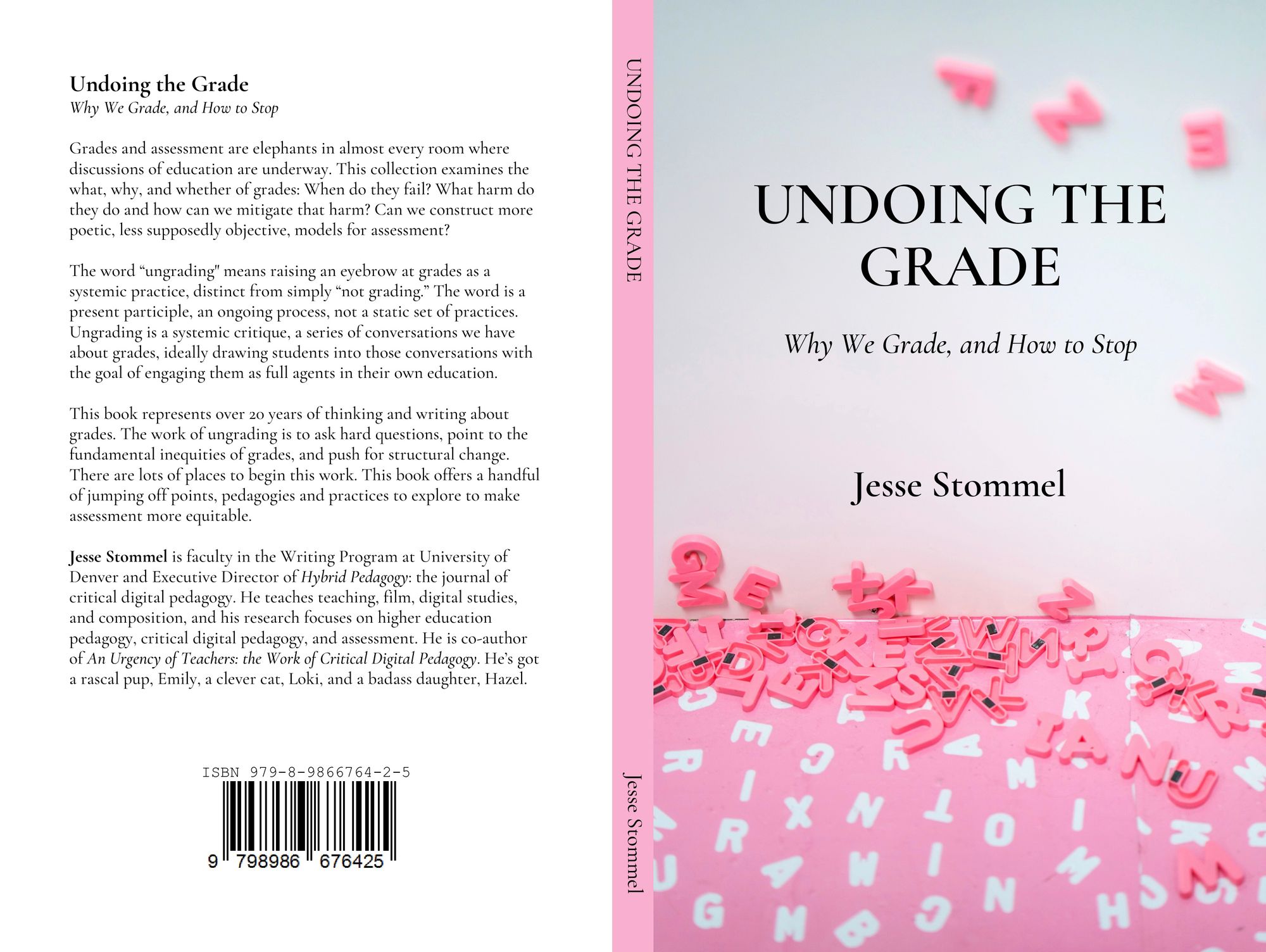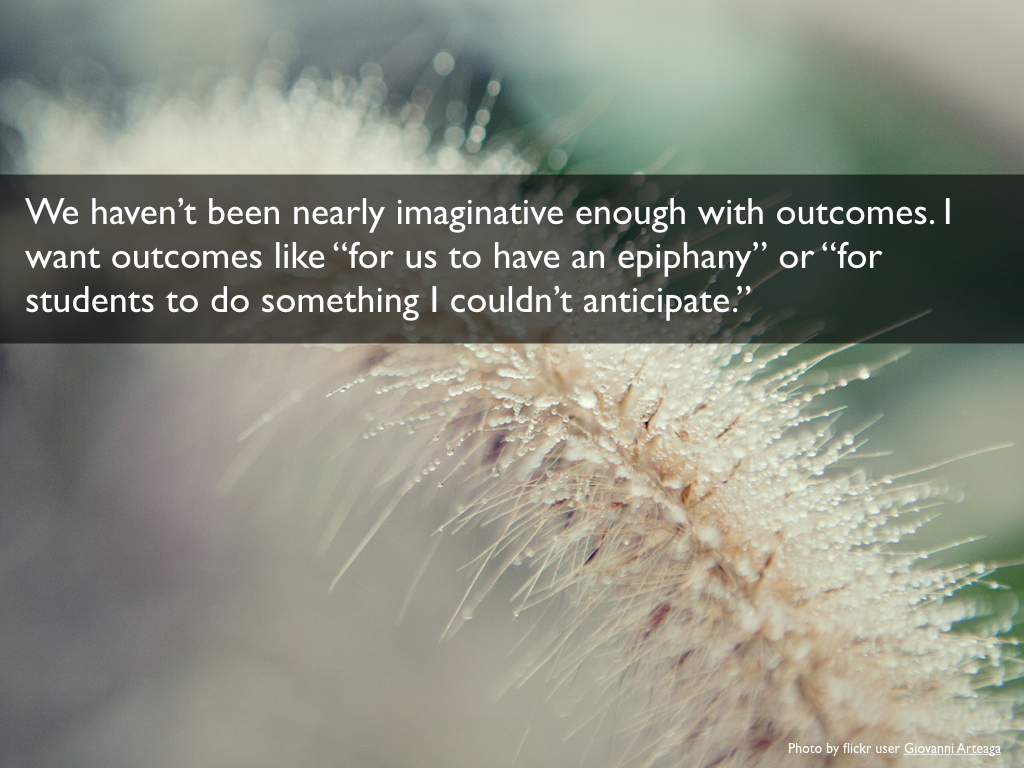Why I Don't Grade
This piece was revised and expanded for my new book, Undoing the Grade: Why We Grade, and How to Stop, available now in paperback and Kindle editions.
Not giving grades doesn't feel like a radical pedagogy for me. I've been not giving grades for 17 years. The first time I taught as instructor of record in Spring 2001, I didn't give grades. I've taught ~100 sections of courses at a half-dozen institutions in a half-dozen disciplines. I've taught traditional students, non-traditional students, for-credit, non-credit, online, in classrooms, as a tenure-track professor, as an adjunct, at SLACs, a Community College, and R1s. I was once a “Road Warrior” adjunct teaching up to nine classes per term at four institutions. I had ~300 students per semester. I didn't put grades on student work. I have only put grades on student work when I was co-teaching with someone who did. I have not always felt I could be fully transparent about my approach to grading at the institutions where I've worked.
My ideas about grades and assessment have evolved over the years, as I've become a better, more confident teacher. But I am even more certain of what I instinctively knew when I taught that first class in 2001: grades are the biggest and most insidious obstacle to education. And they're a thorn in the side of Critical Pedagogy. John Holt writes in Instead of Education, "[Competitive schooling, grades, credentials] seem to me the most authoritarian and dangerous of all the social inventions." Agency, dialogue, self-actualization, and social justice are not possible in a hierarchical system that pits teachers against students and encourages competition by ranking students against one another. Grades (and institutional rankings) are currency for a capitalist system that reduces teaching and learning to a mere transaction. Grading is a massive co-ordinated effort to take humans out of the educational process.
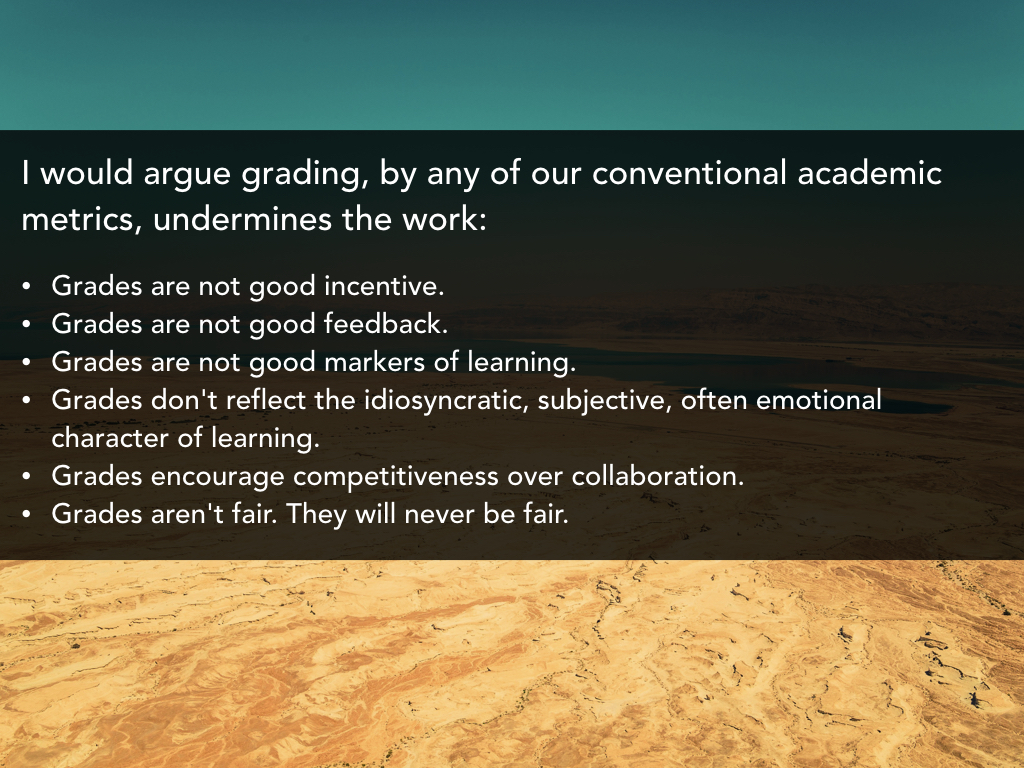
I have previously condensed my own pedagogy into these four words: “Start by trusting students.”
My approach to assessment arises from this. While I've experimented with many alternatives to traditional assessment, I have primarily relied on self-assessment. I turn in final grades at the end of the term, but those grades usually match the grades students have given themselves. (I do tell students 'I reserve the right to change grades,' but this is rare and I mostly have to raise them, because students are often their own harshest critics.)
Amy Fast writes, “the saddest and most ironic practice in schools is how hard we try to measure how students are doing and how rarely we ever ask them.” We have created increasingly elaborate methods of assessment, all while failing to recognize that the students themselves are the best (and always resident) experts in their own learning. Certainly, metacognition, and the ability to self-assess, must be developed, but I see it as one of the most important skills we can teach in any educational environment.
The statement about assessment included in my syllabi:
This course will focus on qualitative not quantitative assessment, something we’ll discuss during the class, both with reference to your own work and the works we’re studying. While you will get a final grade at the end of the term, I will not be grading individual assignments, but rather asking questions and making comments that engage your work rather than simply evaluate it. You will also be reflecting carefully on your own work and the work of your peers. The intention here is to help you focus on working in a more organic way, as opposed to working as you think you’re expected to. If this process causes more anxiety than it alleviates, see me at any point to confer about your progress in the course to date. If you are worried about your grade, your best strategy should be to join the discussions, do the reading, and complete the assignments. You should consider this course a “busy-work-free zone.” If an assignment does not feel productive, we can find ways to modify, remix, or repurpose the instructions.
It's important to note that a gradeless class does not mean grades don't influence the work that happens there. Grades have been naturalized in EDU to the point that new teachers don't feel they can safely explore alternative approaches to assessment. In my experience, new teachers are rarely told they have to grade, but grading is internalized as an imperative nonetheless. And grades have been naturalized to the point that student expectations and anxiety can still swirl around them even when they're taken off the table.
Google Trends shows increased search volume around the term “grades” over the last 14 years. It also shows an increasingly furious pattern of search-behavior centered each year around the months of May and December, like a heartbeat beginning to race. And this has been my anecdotal experience as well, as I've watched the increasing anxiety around grades become more and more palpable.
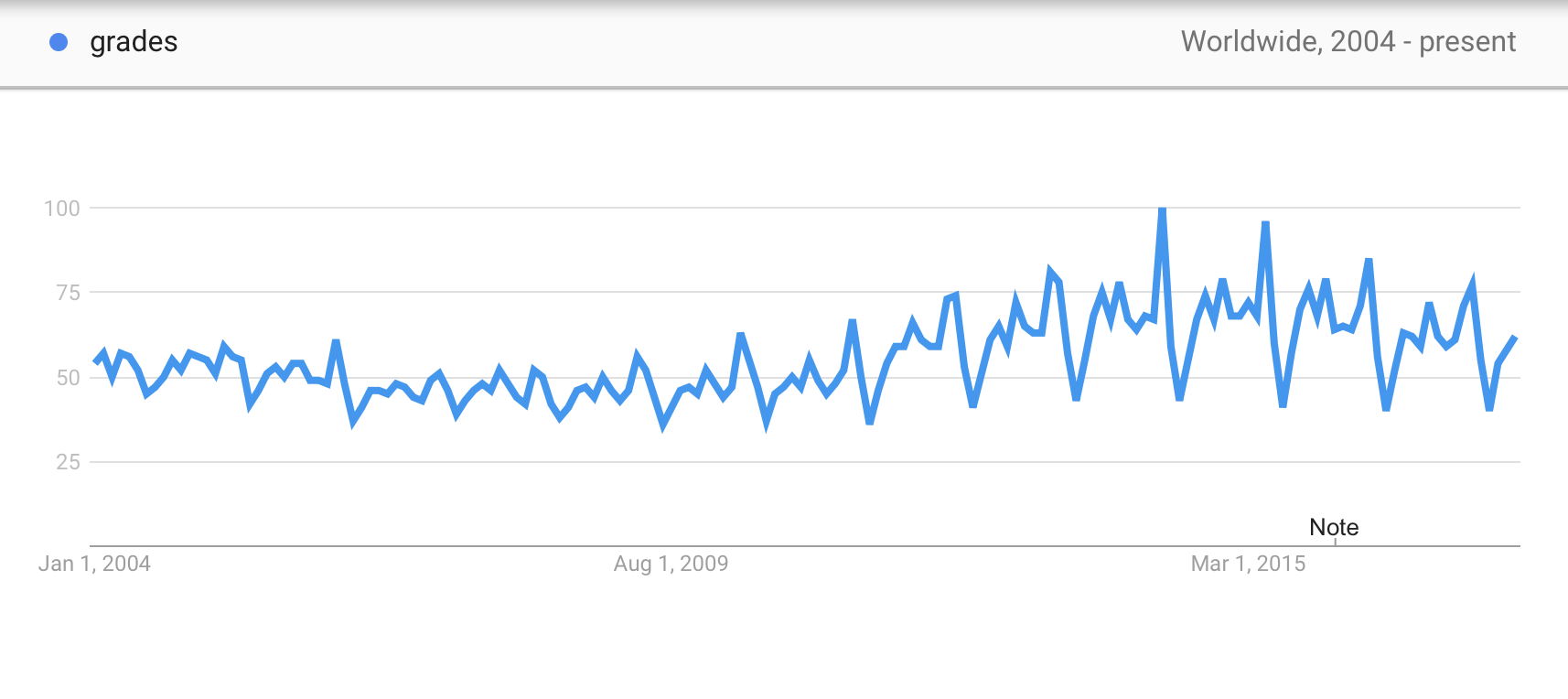
I am also finding myself drowned in buzzwords, a few of which I'll address briefly here.
Learning Outcomes: More and more, we are required to map our assignments, assessments, and curricula to learning outcomes. But I find it strange that teachers and institutions would pre-determine outcomes before students even arrive upon the scene. I have argued, instead, for emergent outcomes, ones that are co-created by teachers and students and revised on the fly. Setting trajectories rather than mapping in advance the possible shapes for learning.
Grade Inflation: The problem, I'd say, is grades not inflation. And when institutions try to “control” grade inflation, the results are disturbing, and perhaps also unsurprising. Require teachers to give more B and C grades and they give more B and C grades disproportionately to black students. In education, I think we should be creating opportunities, not limiting possibilities for success. The best feedback I've ever gotten from a student, and something I've since tried to reflect more explicitly in my pedagogy: “Jesse's class was one of the hardest I've taken in my life; It was an easy 'A'” Having high expectations and giving mostly good grades are not incompatible.

Grade-grubbing: If this phrase is still in your vocabulary, do a quick google search for the words “grub” and “grubber,” and I suspect you'll stop attributing these words to students. As educators, we have helped build (or are complicit in) a system that creates a great deal of pressure around grades. We shouldn't blame (or worse, degrade) students for the failures of that system.
Objectivity: In brief, I do not think objectivity is a virtue if dialogue is what we're after in education. Human interaction is incredibly complex. Authentic feedback (and evaluation) means honoring subjectivity and requires that we show up as our full selves, both teachers and learners, to the work of education. Grades can't be “normed” if we recognize the complexity of learners and learning contexts. Bias can't be accounted for unless we acknowledge it.
Rubrics: Most rubrics I've seen are overly mechanistic and attempt to create objectivity and efficiency in evaluation by crashing upon the rocks of bureaucracy. Learning and human interaction is sufficiently high resolution that a 3x3 grid, or a 5x5 grid, will always be weirdly patronizing. And when they're given in advance to students, rubrics are likely to close down possibility by encouraging students to work toward an overly prescribed notion of “excellence.”
Participation Grades: Most grading scales offer way too many demarcations to communicate clearly and way too few demarcations to reflect reality. Try grading on a traditional scale the last conversation you had with your significant other or the progress your toddler's made toward talking: [78/100] [59%] [A-/B+] [✔️/✔️+] [middle first] [18/20]. All feel arbitrary, even absurd, and none communicate much of value. And how can teachers be on even footing with students if teachers grade student participation. Laura Gibbs writes in “(Un)Grading: It Can Be Done in College,” “Because I put myself outside of the grading loop, I can focus all my efforts on feedback and encouragement — on teaching, not grading.” Which leads me to wonder whether “graded participation” is actually an oxymoron. We can't participate authentically, can't dialogue, without first disrupting the power dynamics of grading.
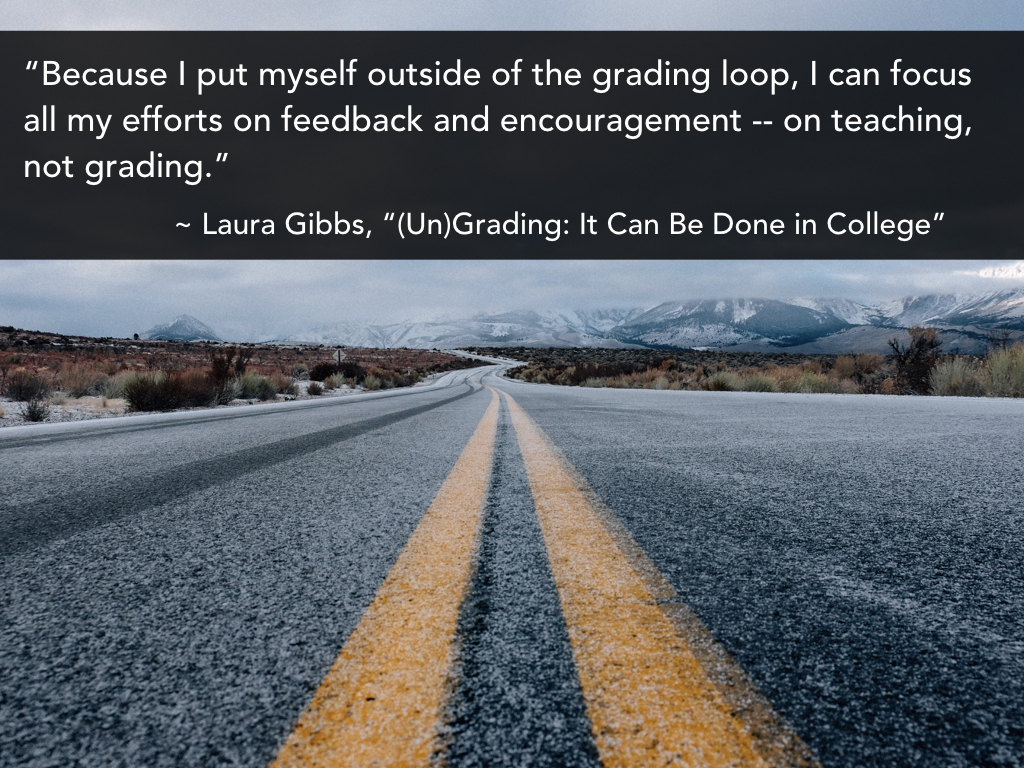
Grades as Motivators: Alfie Kohn writes in “The Trouble with Rubrics,” “Research shows three reliable effects when students are graded: They tend to think less deeply, avoid taking risks, and lose interest in the learning itself.” Grades do motivate, but they don't motivate the kinds of peak experiences that can happen in a learning environment. Something like “have an epiphany, communicate an original thought, sit uncomfortably with your not knowing, or build something that's never been built before” can't be motivated by a grade.
Grading on a Curve: In brief, it pits students against each other, discourages collaboration, and privileges the students who our educational system has already privileged. Cathy N. Davidson writes, “There is an extreme mismatch between what we value and how we count.”
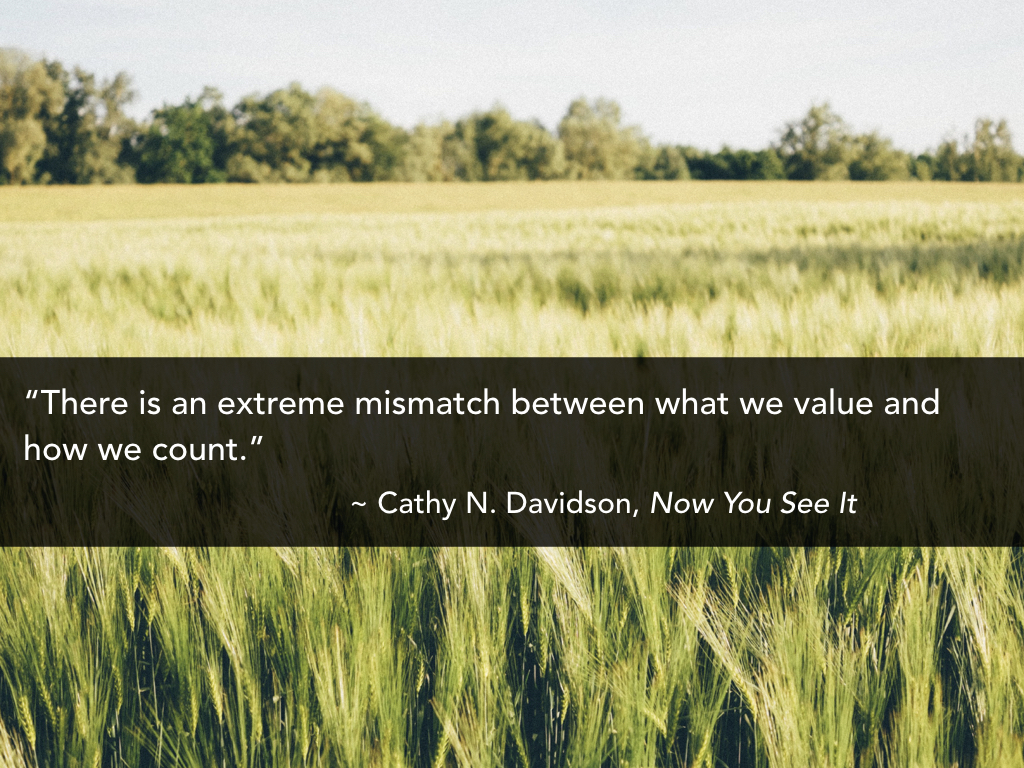
Mastery: I've long argued education should be about encouraging and rewarding not knowing more than knowing. When I give presentatiatons on grading and assessment, I often get some variation of the question: “How would you want your doctor to have been assessed?” My cheeky first answer is that I want the system to assure my doctor has read all the books of Jane Austen, because critical thinking is what will help them save my life when they encounter a situation they've never encountered before. I go on to say that I would want a mixture of things assessed and a mixture of kinds of assessment, because the work of being a doctor (or engineer, sociologist, teacher, etc.) is sufficiently complex that any one system of measurement or indicator of supposed mastery will necessarily fail.
There are lots of alternatives to traditional assessment and ways to approach ungrading, which I'll explore further in a future post. In some ways, I am withholding the mechanics of ungrading deliberately here, because I agree with Alfie Kohn who writes, “When the how’s of assessment preoccupy us, they tend to chase the why’s back into the shadows.” Grades are not something we should have ever allowed to be naturalized. Assessment should be, by its nature, an open question.
